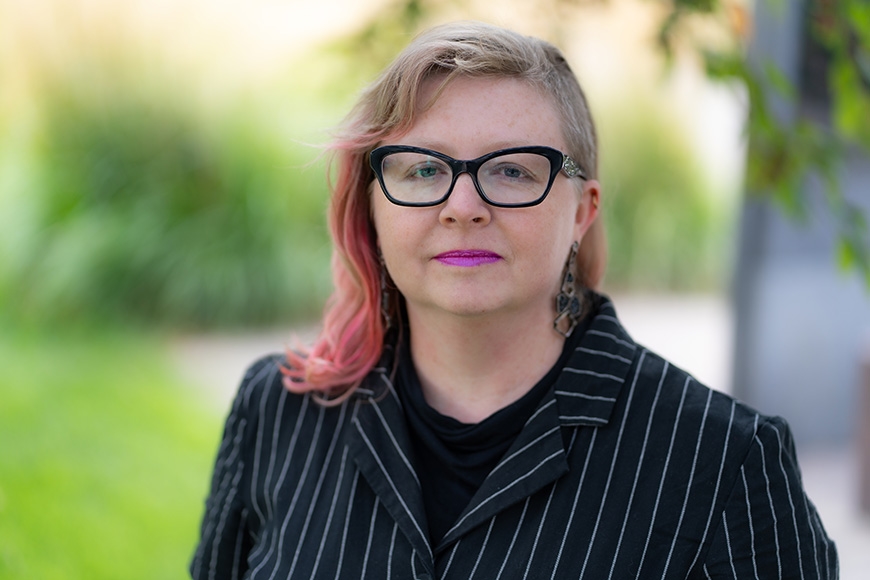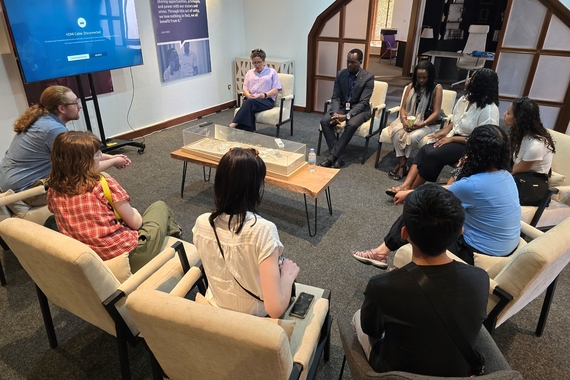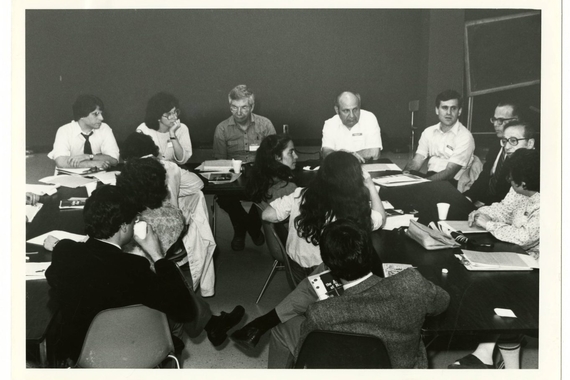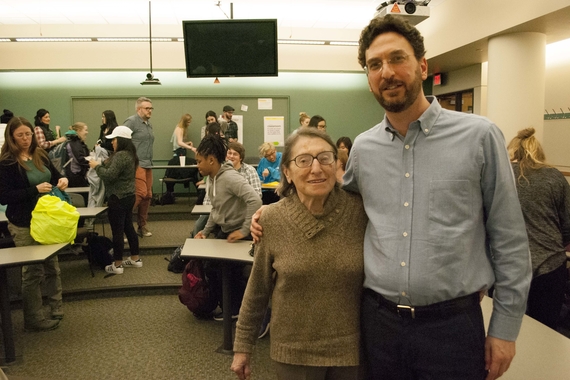Visiting International Law Expert Melanie O’Brien Joins CHGS
The Center for Holocaust & Genocide Studies (CHGS) welcomes Dr. Melanie O’Brien as a visiting professor during the 2023-24 academic year. She joins CHGS from the UWA Law School at the University of Western Australia in Perth, a city she calls home.
Dr. O'Brien's work on forced marriage has been cited by the International Criminal Court, and she has been an amica curia before the ICC. She has been an expert consultant for multiple UN bodies and is widely consulted by global media for her expertise on international criminal law. She has conducted fieldwork and research across six continents.
What are your areas of specialty? How did you become interested in what you study and teach?
My area of speciality is international law, and in particular, international humanitarian law (the laws of war), international criminal law (war crimes, crimes against humanity, and genocide), and international human rights law, with a feminist legal perspective.
I have always had a passion for social justice. When I was growing up, I wrote school assignments on issues like 'save the fur seals'. I also loved films that had a social justice message, like Footloose, which is not just about great music and dancing, but is actually about fighting arbitrary rules and human rights restrictions!
I always wanted to be a lawyer specializing in criminal law, but I also studied high levels of history in high school and have a BA in history. The combination of history and criminal law led me to international criminal law, which is always about history—the history of peoples, the history of conflicts, the history of violence, and the history of the development of the law.
What problems does your work seek to address?
I do many media interviews about international law and armed conflicts or genocides around the world, or about international court cases. My work means that I have the opportunity to share my expertise with the public in this way, which I hope contributes to a greater understanding by the public of what are complex legal issues and processes that are challenging to understand if you are not spending every day on this like I am.
From what you've observed, what do genocides have in common? What factors can lead people down these horrific paths?
In my book, From Discrimination to Death: Genocide Process through a Human Rights Lens, I examined three historical genocides (the Armenian Genocide, the Holocaust, and the Cambodian Genocide), and one current genocide (the Rohingya in Myanmar). I sought to determine if there is a pattern of specific human rights violations that perpetrators do as part of carrying out genocide, and I found that there is.
Genocide is a process, not an event. Perpetrators cannot just start killing people out of the blue. They must build up an acceptance in the majority population to the killing, and this is done through a process of gradually excluding the targeted minority population from society, through discrimination and persecution, excluding the minority group from aspects of life such as employment, education, culture, and healthcare, before the process escalates to confinement, torture, and death. My research found that this pattern existed in all of the genocide case studies I examined.
What are the most common misconceptions people may have about genocide?
One misconception is that victims of genocide can never be perpetrators. Studies show that unfortunately, there can be a cycle of violence with regard to atrocity crimes. Victims can become perpetrators, who can become victims, and so on.
Another misconception is that genocide has to look like the so-called ‘archetype’ of genocide, namely, the Holocaust, with ghettos, concentration camps, and death camps. Genocide can take place without some or all of these actions. One of the things that has struck me in my research is the crucial role that food and sanitation play in causing deaths in genocide. It is not just about shooting, bombing, or gassing people, but often starvation and disease kill many or even more people than direct killing.
Reflecting on the case between South Africa and Israel in the ICJ, have decisions that come from ICJ been enforced with success in the past? Are there any factors that make enforcement more successful?
There is an over 50% rate of compliance with provisional measures ordered by the International Court of Justice. States do comply with the orders of the ICJ because they agree to that Court’s jurisdiction and to be part of the international law system. There is just often an emphasis on those countries who do not comply, so we do not hear so much about countries who do comply. States tend to weigh the costs versus the benefits of compliance. By costs, I do not necessarily mean financial costs, but significantly, also political costs. States have to consider how noncompliance with an order of the so-called ‘World Court’ will impact their relationships with other states (which of course may include trade relationships).
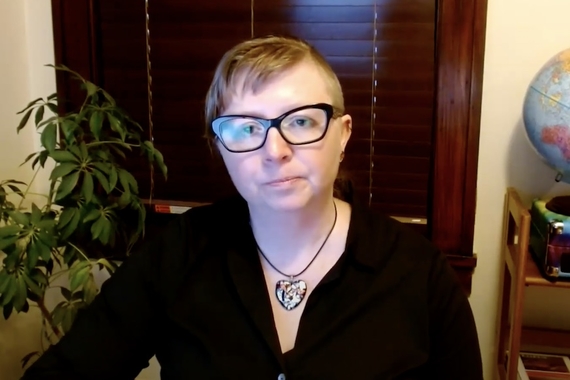
Dr. O'Brien discussed the ICJ decision with Joe Eggers, interim director of the Center for Holocaust & Genocide Studies. Watch the interview (59:10)
Are there any strategies that can help promote peace and reconciliation in post-genocide societies?
As an international criminal lawyer, I believe in the vital role of accountability in post-genocide societies. What that looks like may differ between survivor communities. For example, criminal accountability may be a priority for one community, while something like a truth and reconciliation committee may be preferred elsewhere.
Criminology studies have found that the strongest deterrent of criminal conduct is certainty of punishment, and this applies to international crimes, too. If we do not punish perpetrators of international crimes, not only will they continue to carry them out, but it sends a message to other potential perpetrators that they can commit such atrocities and get away with it and thus atrocity crimes like genocide will continue to happen.
The recent uptick in the use of the Genocide Convention in cases before the International Court of Justice is a good sign that states are taking accountability for genocide seriously, which will hopefully serve as a deterrent for future genocides.
When conflicts, civilian deaths, and displacements occur such as those in Israel-Gaza, Nagorno-Karabakh, Darfur, and Ukraine, how can organizations like the UMN Center for Holocaust & Genocide Studies help?
Genocide scholars make a significant contribution to understanding how genocide happens, how we can prevent it, how we can educate about it, and how we can punish it. It is important for the community, educators and for policy-makers to engage with the work of academic institutions such as CHGS to access this expertise.
CHGS regularly runs in-person and online public events, open to anyone to attend and learn more about different genocides. The center also works extensively with local survivor community groups such as the Jewish and Armenian communities, and also with local educators to provide guidance in teaching about genocide.
Individual scholars can also be advocates, engaging more broadly with the public through media appearances, and consulting with international organisations and policy-makers, providing advice to assist with better policies and actions related to genocide prevention, education and punishment.
What courses are you currently teaching?
I am teaching undergraduate political science students an introduction to international law that regulates armed conflict and international crimes. This is a new experience for me, as I usually teach law students (master’s level). However, international law plays a significant role in government activities, so I think it will be very useful for political science undergraduate students to learn a bit about this field, even if they do not intend to go on to study law.
Are you involved with any community-engaged projects or courses?
I regularly work with survivor communities: communities who have survived genocide or who are descended from those who survived genocide, or communities from situations of human rights abuses. I most often work with Jewish, Armenian, and Iranian communities.
In this capacity, I advocate for their rights for accountability for the human rights abuses they have experienced. For example, in Australia, I work with the Armenian community to lobby the federal government to recognize the Armenian Genocide; and I have also lobbied the UK government to take action on the crimes committed by Azerbaijan against Armenians in Nagorno-Karabakh. In 2022, I was awarded the Filon Ktenidis Award by the Australian Greek community for my work 'fighting for justice for victims of genocide', and it is the award I am most proud of.
What projects are you working on right now?
While I am at the University of Minnesota, I am organizing a workshop in March on Nagorno-Karabakh. This ethnically Armenian enclave was completely ethnically cleansed at the end of September 2023, after months of siege leading to starvation, by Azerbaijan.
While it initially got some media attention, in early October, these shocking atrocity crimes were immediately forgotten by everyone. I have been working on Nagorno-Karabakh for years and give many talks on the issues around the war crimes and other atrocities that have been experienced by Armenians there. The workshop will be an important contribution to an under-researched topic that needs more attention. It will include a public talk and photo exhibit of Nagorno-Karabakah culture by Armenian-American photographer, Scout Tufjankian, at the St. Sahag Armenian Church in St. Paul, Minnesota at 6:00 PM on March 21.
